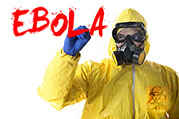Ebola in Spain:
are we safe?

Ebola is seemingly portrayed as the stuff of contagion movies, spreading rapidly, killing with little chance of survival. The media hype that has increased since Ebola arrived in Europe and the USA is phenomenal. But is it deserved? The answer is mixed. The current epidemic in Africa is worrying: scientists cannot currently predict its impact.They suggest it has another few months before it peaks but are unsure. It is an outbreak unlike those before, mainly because it has hit countries with good transport networks, very poor health care infrastructures, coupled with a poor global response to the problem. It has so far not been contained like previous outbreaks and is spreading wider and faster. The situation in Africa is concerning. However we have seen good practice in Africa in the current epidemic, where Ebola has been contained and halted: Nigeria and Senegal are such examples. It is theoretically possible with the right resources and management to stop it.
Should we be concerned here? The case of Teresa Romero Ramos, the nurse in Madrid and similar cases in the USA make people nervous, but Health care workers are more at risk. While its is still unclear how the nurses contracted the disease, the likely scenario is that infection control policies failed. Equipment and procedures do fail and in clinical settings the risks are high: hence the numbers of health care practitioners in and returning from Africa infected. Health care workers are in contact with patients at their most infectious. The level of the virus is at its highest when patients die or afterwards. This is the most dangerous time as they leak from the body in multiple body fluids. If protection fails the likelihood of infection is almost certain. What is emerging as good news, however, is when patients are without symptoms or early in the disease, they are not highly infectious. The cases of Teresa Romero and others show that there are no signs they infected their close contacts in the community. You really need to come into direct contact with infected body fluids to become infected. Ebola is actually less infectious than it is portrayed. It is less infectious than the common cold, measles, TB and chickenpox. It is also relatively fragile so can be killed with detergents and UV, so decontamination processes are possible and easy to implement.
The other thing to remember is there are structures in place to manage such diseases in Europe. We have robust Health care systems, lacking in the Africa epidemic. The European Health Protection Agency liases internationally on Public Health emergency planning and management in such crises, we have good Public Health systems in Catalonia at the Generalitat and in other Spanish regions working to implement emergency plans, disease detection, control, and management on a local level. Here in Barcelona there has always been a fully operational unit in Hospital Clinic to manage such diseases and a team of medics and scientists all working in this field.
The impact of Ebola also needs to be put into perspective. It is a killer for sure, but during the current outbreak 70 times more people in Africa have died from malaria and 40 times more people from hunger. Here in Europe coronary heart disease, cancer and accidents are bigger killers and getting in your car is currently a more risky thing to do. While Ebola in Africa is a concern, we can at least relax about it here. If you wish to help, donate to one of the agencies fighting it on the frontline.





Sin Comentarios